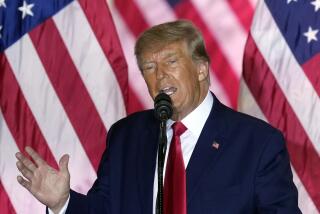Wallach Quoted as Hoping to Make Money for Meese
- Share via
WASHINGTON — Attorney E. Robert Wallach told a National Security Council aide in 1985 that he hoped to make money for his longtime friend Atty. Gen. Edwin Meese III, who was then helping Wallach secure U.S. support for a $1-billion Iraqi pipeline project, according to testimony given in a federal investigation of Meese.
David Wigg, once the NSC’s point man on the project, testified Thursday that Wallach described Meese as a loyal public servant whose finances had suffered during his low-paying government career, sources familiar with his testimony said Friday.
A federal grand jury, under the direction of independent counsel James C. McKay, is investigating whether the attorney general violated federal law in assisting Wallach on the proposed pipeline, which never was built.
In recounting his conversation with Wallach, Wigg said Wallach gave no indication that Meese knew of the attorney’s plans to assist him financially, the sources said.
One source involved in the Meese investigation stressed that Wigg’s statement is hearsay and would have to be corroborated before it could be used as evidence.
Nevertheless, the testimony directly addresses what prosecutors believe is the critical issue in McKay’s investigation--whether Meese derived or expected to derive personal benefit for the assistance he gave Wallach in the pipeline and other matters.
George G. Walker, Wallach’s attorney, said after checking with his client that Wallach did not recall the conversation with Wigg but that, if it did occur, it “would have had to do with finding a resourceful and competent investment counselor for Meese. It would not have related to monies for the pipeline or making the pipeline go.”
Wallach did introduce Meese to W. Franklyn Chinn, Wallach’s investment adviser, whose stock trading for Meese is also under investigation by McKay. Wallach and Chinn already face trial on federal racketeering and conspiracy charges in New York for allegedly defrauding Wedtech Corp. in a scheme that involved attempts to influence Meese in a bid to win an Army contract.
Wigg was the White House’s key link to Wallach in the last months of 1985, when U.S. efforts to secure insurance for the proposed pipeline were at their peak. One official close to McKay’s investigation said Wigg is “cooperating extensively” in the case.
Wigg could not be reached for comment late Friday.
Rappaport Cooperating
Another key figure in the investigation, Swiss oilman Bruce Rappaport, is also cooperating in the case. Rappaport, a major promoter of the pipeline who retained Wallach as his attorney on the project, said in an interview with The Times that he will soon provide sworn testimony to McKay’s investigators.
A source familiar with the investigation said Rappaport, who has grown increasingly critical of Wallach, will give the testimony under a grant of immunity from prosecution.
Wigg, in his testimony, also explained to the grand jury a controversial proposal advanced in late 1985 to use Pentagon military aid earmarked for Israel as insurance to guard against any Israeli attack on the project, the sources said.
Iraq had demanded a $400-million cash guarantee against an Israeli attack as a condition of approving construction of the pipeline, which was to parallel Israel’s border through Iraqi oil fields to the Red Sea. Wallach originally sought NSC aid in getting the insurance from a federal agency, the Overseas Private Investment Corp., but turned to the Pentagon plan when those efforts fell through.
Guarantee Against Attack
As Wigg described the proposal, sources said, a portion of Israel’s annual allotment under the U.S. foreign military sales program would have been reserved as a guarantee against an Israeli attack. Israel normally receives its entire aid allotment, now about $1.8 billion, at the start of each year.
As construction costs were paid off, the reserved portion of the aid gradually would have been doled out to Israel until the entire construction cost was amortized and the aid account depleted.
It could not be learned whether the proposal was to tap Israel’s regular aid package or would instead have involved a special aid appropriation, but either option apparently would have required approval by Congress or the White House.
Money allotted under the foreign military sales program is restricted almost entirely to purchases of military hardware from American businesses, though Israel has previously used some of the aid to finance its own domestic defense industry.
More to Read
Get the L.A. Times Politics newsletter
Deeply reported insights into legislation, politics and policy from Sacramento, Washington and beyond. In your inbox twice per week.
You may occasionally receive promotional content from the Los Angeles Times.






